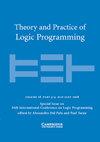并行机器调度中词典最大完工时间优化的答案集规划
IF 1.1
2区 数学
Q3 COMPUTER SCIENCE, SOFTWARE ENGINEERING
引用次数: 0
摘要
摘要:本文从半导体车间生产的实际应用中,处理具有顺序相关的安装时间和发布日期的并行机器上具有挑战性的调度问题。在这种情况下,作业只能由专用的机器来处理,因此很少有机器可以确定完工时间,而不管剩余机器上的作业是如何调度的。当机器发生故障并且需要重新调度作业时,这会导致问题。我们不是只优化makespan,而是将各个机器跨度按非升序排列,并按字典顺序最小化结果元组。这实现了所有机器尽可能早地完成,并增加了调度的健壮性。为了解决这一问题,我们研究了答案集规划(ASP)的应用。虽然ASP简化了建模,但时间约束和考虑的目标函数的组合对当前的求解技术提出了挑战。前一个问题是通过使用基于差异逻辑的ASP扩展来解决的。对于后者,我们设计了使用多镜头求解的不同算法。为了处理工业规模的实例,我们研究了不同的近似和启发式方法。我们的实验结果表明,ASP确实是解决该问题的一种有前途的知识表示和推理(KRR)范式,并且与最先进的约束规划(CP)和混合整数规划(MIP)求解器竞争。本文章由计算机程序翻译,如有差异,请以英文原文为准。
Answer-Set Programming for Lexicographical Makespan Optimisation in Parallel Machine Scheduling
Abstract We deal with a challenging scheduling problem on parallel machines with sequence-dependent setup times and release dates from a real-world application of semiconductor work-shop production. There, jobs can only be processed by dedicated machines, thus few machines can determine the makespan almost regardless of how jobs are scheduled on the remaining ones. This causes problems when machines fail and jobs need to be rescheduled. Instead of optimising only the makespan, we put the individual machine spans in non-ascending order and lexicographically minimise the resulting tuples. This achieves that all machines complete as early as possible and increases the robustness of the schedule. We study the application of answer-set programming (ASP) to solve this problem. While ASP eases modelling, the combination of timing constraints and the considered objective function challenges current solving technology. The former issue is addressed by using an extension of ASP by difference logic. For the latter, we devise different algorithms that use multi-shot solving. To tackle industrial-sized instances, we study different approximations and heuristics. Our experimental results show that ASP is indeed a promising knowledge representation and reasoning (KRR) paradigm for this problem and is competitive with state-of-the-art constraint programming (CP) and Mixed-Integer Programming (MIP) solvers.
求助全文
通过发布文献求助,成功后即可免费获取论文全文。
去求助
来源期刊

Theory and Practice of Logic Programming
工程技术-计算机:理论方法
CiteScore
4.50
自引率
21.40%
发文量
40
审稿时长
>12 weeks
期刊介绍:
Theory and Practice of Logic Programming emphasises both the theory and practice of logic programming. Logic programming applies to all areas of artificial intelligence and computer science and is fundamental to them. Among the topics covered are AI applications that use logic programming, logic programming methodologies, specification, analysis and verification of systems, inductive logic programming, multi-relational data mining, natural language processing, knowledge representation, non-monotonic reasoning, semantic web reasoning, databases, implementations and architectures and constraint logic programming.
 求助内容:
求助内容: 应助结果提醒方式:
应助结果提醒方式:


